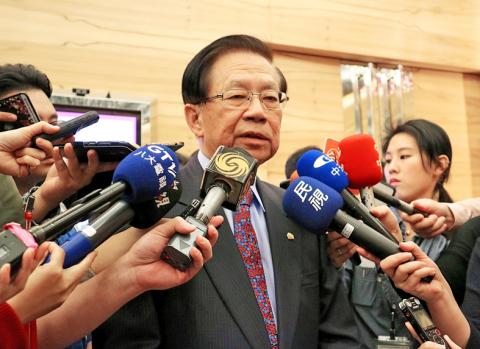Straits Exchange Foundation (SEF) Chairman Tien Hung-mao (田弘茂) yesterday said he would like to invite China’s Association for Relations Across the Taiwan Straits (ARATS) Chairman Chen Deming (陳德銘) for talks at an opportune time, preferably on Kinmen.
Tien made the remark at the foundation’s end of the Lunar Year media luncheon in Taipei, saying that Beijing should seriously consider his proposal.
There has been a high level of “attention and even anxiety from some quarters” with the current state of cross-strait relations, which had “undeniably showed signs of retrograde development” since the transition of government in Taiwan, with Beijing rejecting proposals to “smooth relations,” Tien said.

Photo: CNA
US president-elect Donald Trump’s policies might prove influential in the international community and complicate cross-strait relations, Tien added.
While Taiwan must respond to changing conditions prudently, the overall situation is not as severe as some had feared, Tien said.
“Looking back on our experience over the past 20 years, one could say the situation across the Taiwan Strait was often more severe than what is found currently and they were certainly more difficult to deal with. As interactions accumulate, cross-strait relations had became more complex and diversified, the foundation’s commitment and crucial role in negotiation, exchange and service have not changed,” he said.
“We continue to assert the principles of no political preconditions, mutual respect and openness to innovation as the basis of talks with Beijing, while showing goodwill and creating a friendly environment for communication,” he said, adding that the government wants exchanges with China by previously established institutions to “return to normal.”
“I understand that Chen has visited Taiwan three times, but had never set foot on Kinmen. If it proves opportune, I look forward to meeting him there. Kinmen is a good place to start meeting. I hope Beijing will take this proposal seriously,” Tien said.
When asked to comment on China’s insistence on the “one China” principle, Tien said President Tsai Ing-wen (蔡英文) had on multiple occasions made clear statements regarding the government’s position and her remarks are the basis for the future conduct of cross-strait relations.
Tien declined to elaborate on Tsai’s position on the so-called “1992 consensus,” saying: “I believe the Presidential Office is the only appropriate authority to comment on such issues.”
The “1992 consensus,” a term former Mainland Affairs Council chairman Su Chi (蘇起) in 2006 admitted making up in 2000, refers to a tacit understanding between the Chinese Nationalist Party (KMT) and the Chinese government that both sides of the Strait acknowledge there is “one China,” with each side having its own interpretation of what “China” means.

Alain Robert, known as the "French Spider-Man," praised Alex Honnold as exceptionally well-prepared after the US climber completed a free solo ascent of Taipei 101 yesterday. Robert said Honnold's ascent of the 508m-tall skyscraper in just more than one-and-a-half hours without using safety ropes or equipment was a remarkable achievement. "This is my life," he said in an interview conducted in French, adding that he liked the feeling of being "on the edge of danger." The 63-year-old Frenchman climbed Taipei 101 using ropes in December 2004, taking about four hours to reach the top. On a one-to-10 scale of difficulty, Robert said Taipei 101

A preclearance service to facilitate entry for people traveling to select airports in Japan would be available from Thursday next week to Feb. 25 at Taiwan Taoyuan International Airport, Taoyuan International Airport Corp (TIAC) said on Tuesday. The service was first made available to Taiwanese travelers throughout the winter vacation of 2024 and during the Lunar New Year holiday. In addition to flights to the Japanese cities of Hakodate, Asahikawa, Akita, Sendai, Niigata, Okayama, Takamatsu, Kumamoto and Kagoshima, the service would be available to travelers to Kobe and Oita. The service can be accessed by passengers of 15 flight routes operated by

Taiwanese and US defense groups are collaborating to introduce deployable, semi-autonomous manufacturing systems for drones and components in a boost to the nation’s supply chain resilience. Taiwan’s G-Tech Optroelectronics Corp subsidiary GTOC and the US’ Aerkomm Inc on Friday announced an agreement with fellow US-based Firestorm Lab to adopt the latter’s xCell, a technology featuring 3D printers fitted in 6.1m container units. The systems enable aerial platforms and parts to be produced in high volumes from dispersed nodes capable of rapid redeployment, to minimize the risk of enemy strikes and to meet field requirements, they said. Firestorm chief technology officer Ian Muceus said

MORE FALL: An investigation into one of Xi’s key cronies, part of a broader ‘anti-corruption’ drive, indicates that he might have a deep distrust in the military, an expert said China’s latest military purge underscores systemic risks in its shift from collective leadership to sole rule under Chinese President Xi Jinping (習近平), and could disrupt its chain of command and military capabilities, a national security official said yesterday. If decisionmaking within the Chinese Communist Party has become “irrational” under one-man rule, the Taiwan Strait and the regional situation must be approached with extreme caution, given unforeseen risks, they added. The anonymous official made the remarks as China’s Central Military Commission Vice Chairman Zhang Youxia (張又俠) and Joint Staff Department Chief of Staff Liu Zhenli (劉振立) were reportedly being investigated for suspected “serious